人教版九年级全册Unit 1 How can we become good learners-Section B (2a-2e)课件(共38张PPT,内嵌音频)
文档属性
| 名称 | 人教版九年级全册Unit 1 How can we become good learners-Section B (2a-2e)课件(共38张PPT,内嵌音频) | 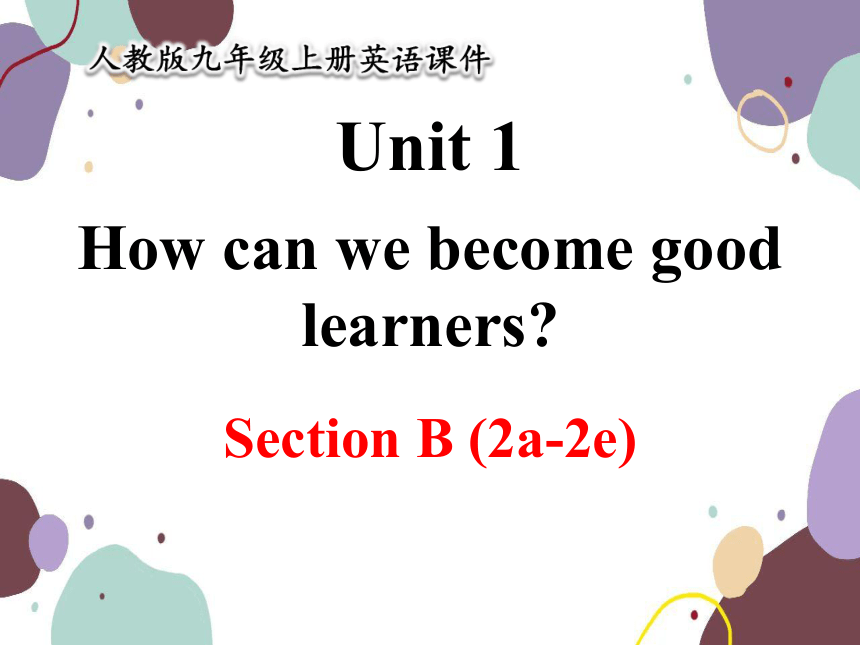 | |
| 格式 | pptx | ||
| 文件大小 | 28.4MB | ||
| 资源类型 | 教案 | ||
| 版本资源 | 人教新目标(Go for it)版 | ||
| 科目 | 英语 | ||
| 更新时间 | 2023-07-09 11:50:23 | ||
图片预览


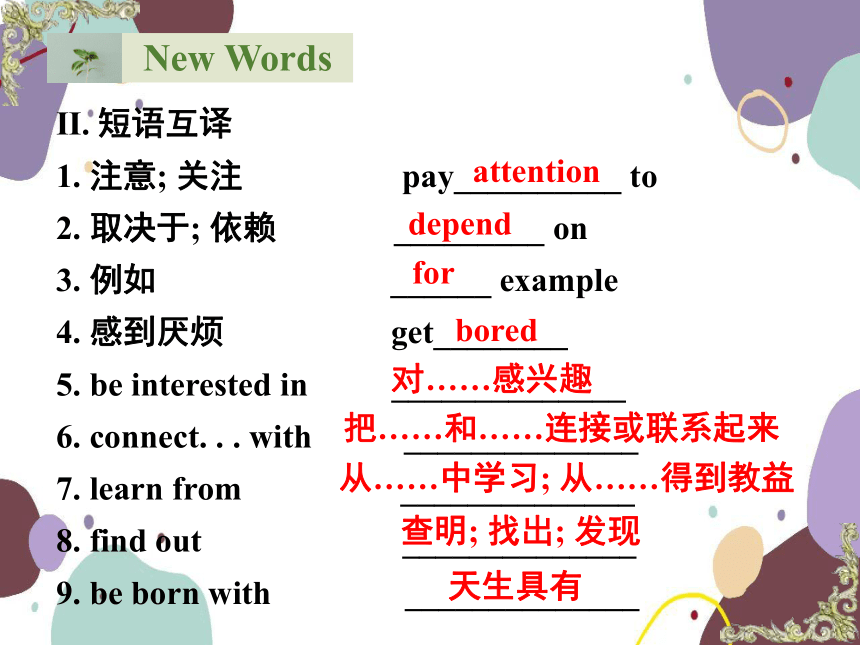
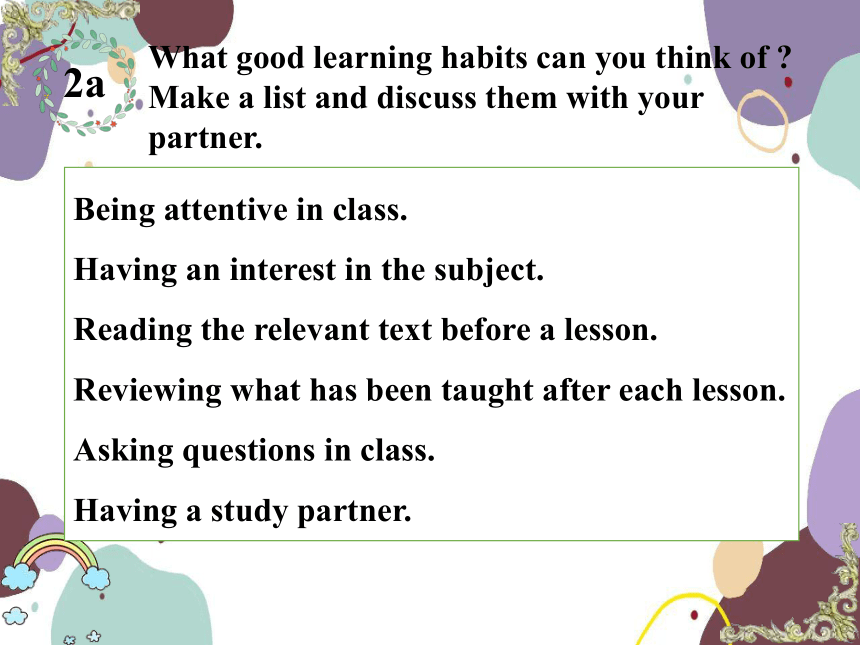

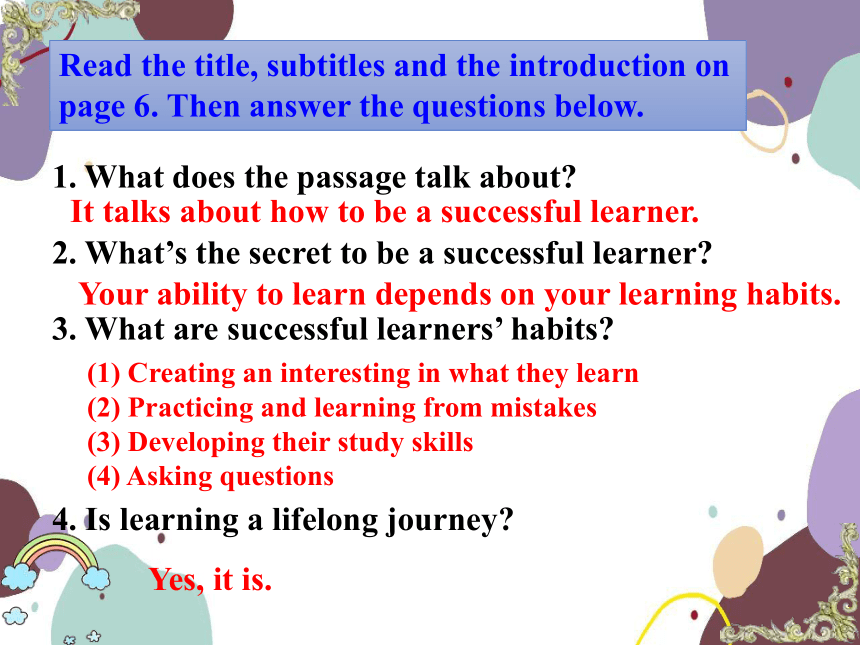
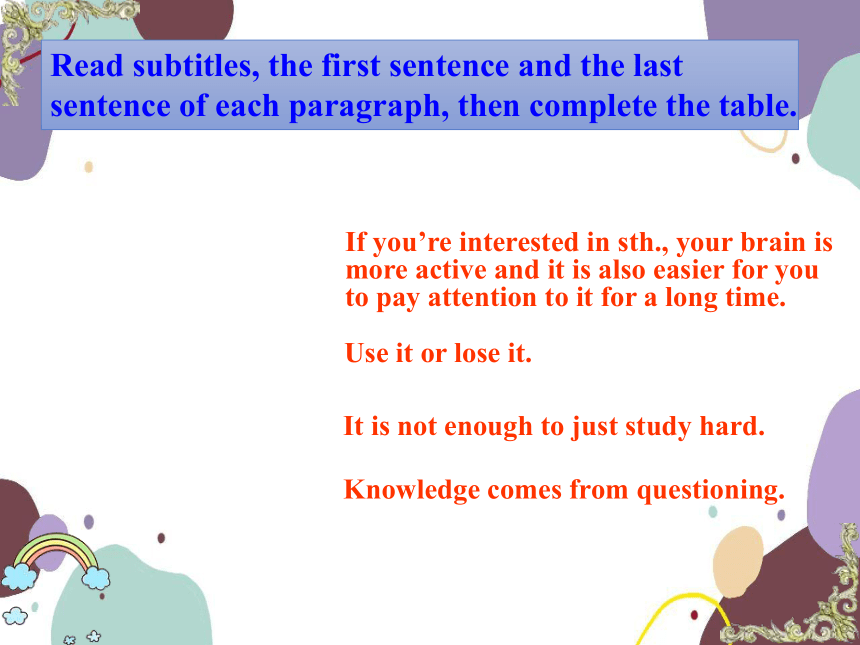
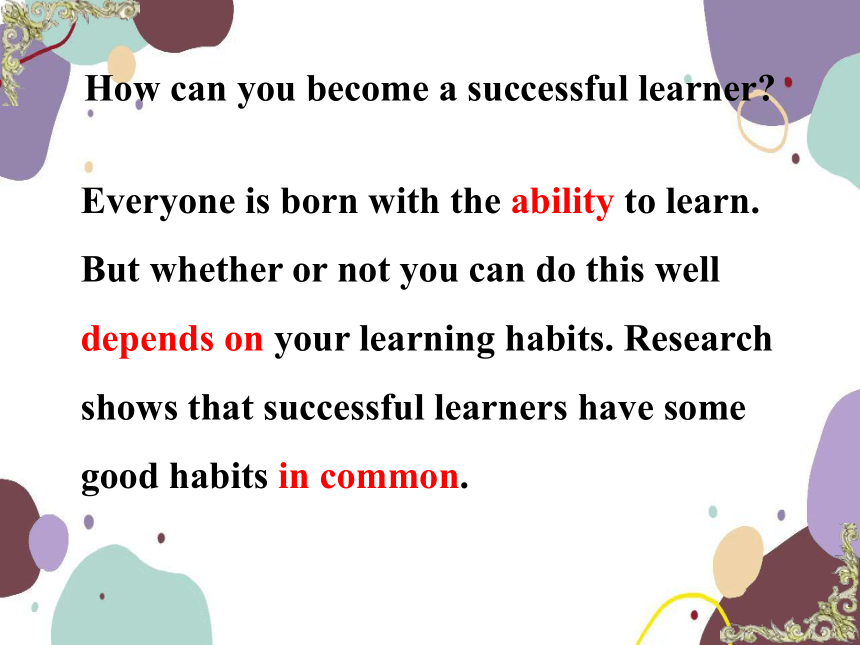
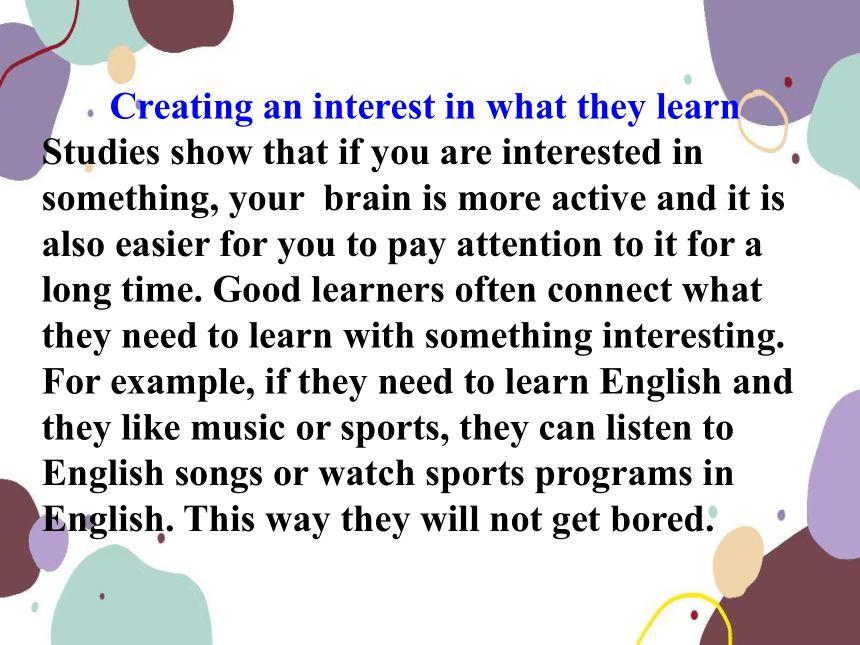
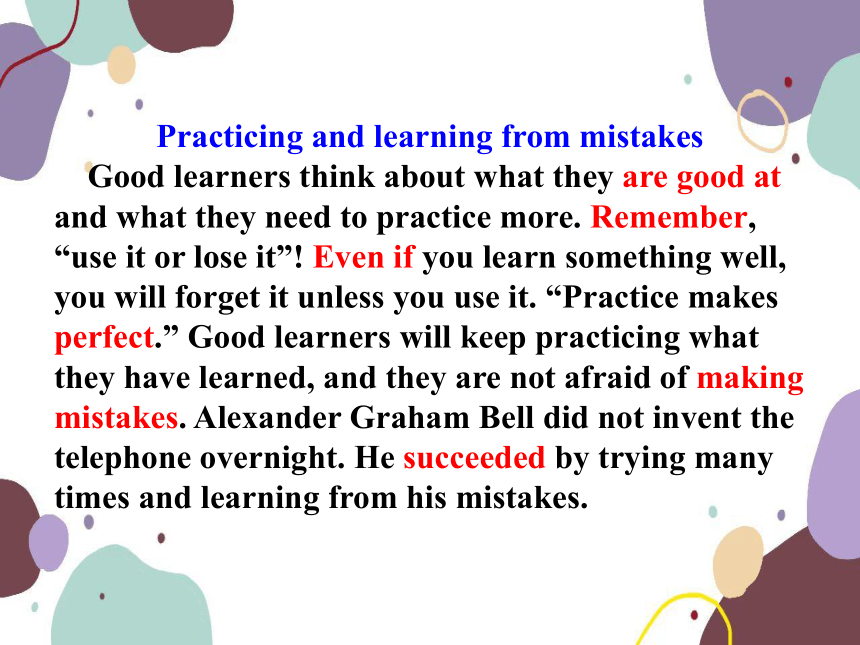
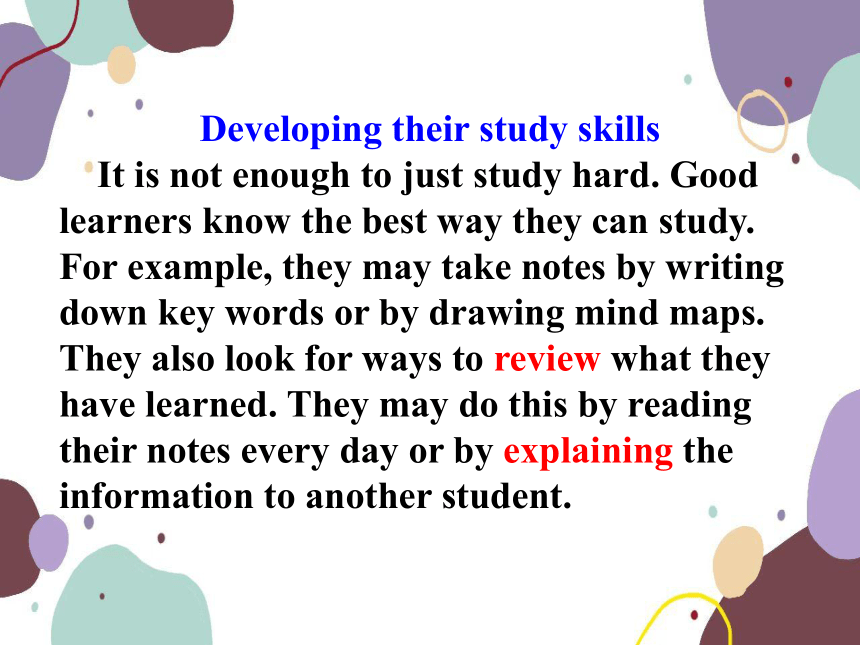
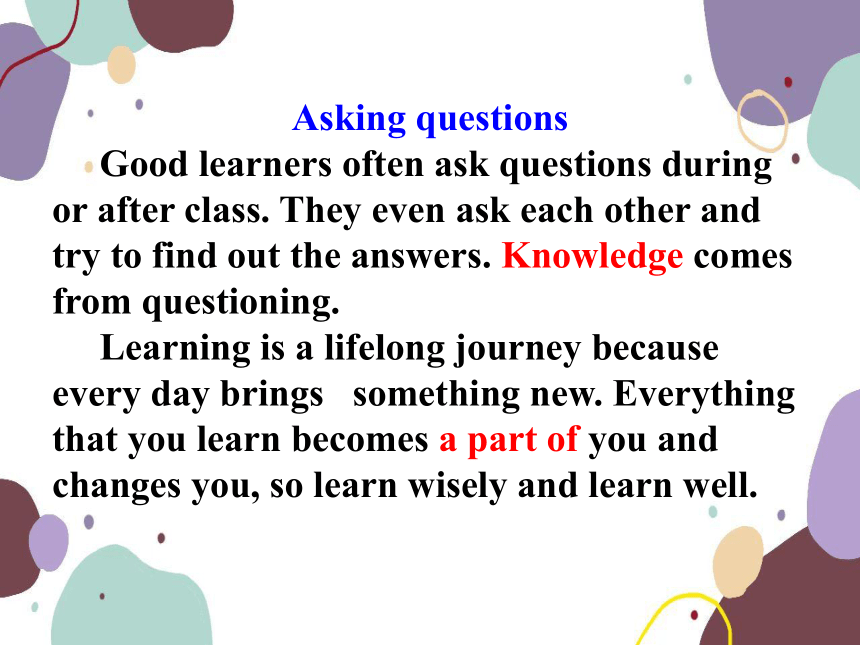
文档简介
(共38张PPT)
人教版九年级上册英语课件
Section B (2a-2e)
Unit 1
How can we become good learners
New Words
Ⅰ. 单词填写
1. born(v. & adj. ) ______________
2. active(adj. ) ______________
3. overnight(adv. ) ______________
4. knowledge(n. ) ______________
5. 能力; 才能(n. ) ______________
6. 创造; 创建(v. ) ______________
7. 大脑(n. ) ______________
8. wise(adj. )→__________ (adv. )明智地; 聪明地
出生; 天生的
活跃的; 积极的
一夜之间; 在夜间
知识; 学问
ability
create
brain
wisely
New Words
Ⅱ. 短语互译
1. 注意; 关注 pay__________ to
2. 取决于; 依赖 _________ on
3. 例如 ______ example
4. 感到厌烦 get________
5. be interested in ______________
6. connect. . . with ______________
7. learn from ______________
8. find out ______________
9. be born with ______________
attention
depend
for
bored
对……感兴趣
把……和……连接或联系起来
从……中学习; 从……得到教益
查明; 找出; 发现
天生具有
2a
What good learning habits can you think of Make a list and discuss them with your partner.
Being attentive in class.
Having an interest in the subject.
Reading the relevant text before a lesson.
Reviewing what has been taught after each lesson.
Asking questions in class.
Having a study partner.
2b
Read the passage quickly and check if any of the habits you listed in 2a are mentioned. Which four habits of successful learners can you find from the passage
Using Dictionaries
This can help you find the definition that matches the context of the word in the text.
Read the title, subtitles and the introduction on page 6. Then answer the questions below.
What does the passage talk about
2. What’s the secret to be a successful learner
3. What are successful learners’ habits
4. Is learning a lifelong journey
It talks about how to be a successful learner.
Your ability to learn depends on your learning habits.
(1) Creating an interesting in what they learn
(2) Practicing and learning from mistakes
(3) Developing their study skills
(4) Asking questions
Yes, it is.
Read subtitles, the first sentence and the last sentence of each paragraph, then complete the table.
If you’re interested in sth., your brain is more active and it is also easier for you to pay attention to it for a long time.
Use it or lose it.
It is not enough to just study hard.
Knowledge comes from questioning.
How can you become a successful learner
Everyone is born with the ability to learn. But whether or not you can do this well depends on your learning habits. Research shows that successful learners have some good habits in common.
Creating an interest in what they learn
Studies show that if you are interested in something, your brain is more active and it is also easier for you to pay attention to it for a long time. Good learners often connect what they need to learn with something interesting. For example, if they need to learn English and they like music or sports, they can listen to English songs or watch sports programs in English. This way they will not get bored.
Practicing and learning from mistakes
Good learners think about what they are good at and what they need to practice more. Remember, “use it or lose it”! Even if you learn something well, you will forget it unless you use it. “Practice makes perfect.” Good learners will keep practicing what they have learned, and they are not afraid of making mistakes. Alexander Graham Bell did not invent the telephone overnight. He succeeded by trying many times and learning from his mistakes.
Developing their study skills
It is not enough to just study hard. Good learners know the best way they can study. For example, they may take notes by writing down key words or by drawing mind maps. They also look for ways to review what they have learned. They may do this by reading their notes every day or by explaining the information to another student.
Asking questions
Good learners often ask questions during or after class. They even ask each other and try to find out the answers. Knowledge comes from questioning.
Learning is a lifelong journey because every day brings something new. Everything that you learn becomes a part of you and changes you, so learn wisely and learn well.
1. Everyone is born with the ability to learn. But whether or not you can do this well depends on your learning habits.
Be born 意为“天生,出生”为被动语态, be 动词通常用was 或were,born 为bear 的过去式。
e.g. I was born in a small village.
我出生在一个小山村。
Grammar
(2) ability 在此处为不可数名词,意为“能力”常构成短语 have the ability to do sth. ( 有能力做某事) 。
Man has the ability to speak.
人类有说话的能力。
(3) whether or not 意为“是否” whether引导主语从句,不能与if 替换。
whether she will come or not is still a problem.
她是否会来还是个问题。
Grammar
depend on sb./ sth. to do sth.
I’m depending on you to get this done.
我指望着你把这件事给办了。
(3) depend on/ upon 依据;依赖
Grammar
2. ... successful learners have some good habits in common.
have sth. in common (with sb./ sth.)(与某人、某物有相同之处)
Their methods have a lot in common.
他们的方法有很多相同之处。
in common意为“共同的,共有的”。
Grammar
3. pay attention to注意; 关注
【语境领悟】
It is also easier for you to pay attention to it for a long time.
对你来说也更容易对它长时间关注。
【自主归纳】
pay attention to意为“注意; 关注”, 其中to为介词, 后跟名词、代词或动词-ing形式作宾语。
【学以致用】
—I have trouble learning English this term.
—You should pay more ______ to your teacher’s advice.
A. time B. attention C. use D. heart
Grammar
4. Good learners often connect what they need to learn with something they are interested in.
(1) connect…with…意为“ 把……和……联系起来” 其中connect为及物动词,意为“(使)连接;与…有联系”,其名词形式为connection,意为“连接;关系”.
Please don’t connect this person with that person.
请不要把这个人和那个人联系在一起。
Grammar
(2) need 在此处为及物动词,意为“需要” 其后跟名词、代词、动词不定式或动词-ing形式。need作实义动词时,既可用于肯定句,也可用于否定句和疑问句,构成否定和疑问句时要借助助动词do/ does/ did.
You need to take good care of your mother.
你要好好照顾你妈妈。
Grammar
5. Good learners think about what they are good at and what they need to practice more.
(1)Think about 意为“考虑”其后接名词、代词、动词-ing形式或宾语从句。
They are thinking about a serious problem.
他们正在考虑一个严肃的问题。
(2) Be good at “擅长” 同义于 do well in “在某方面做得好”
He is good at English.= he does well in English.
Grammar
6. Even if you learn something well, you will forget it unless you use it.
(1)Even if 意为“即使,尽管”,用于引导让步状语从句,有退一步设想的意味,同义于 “ even though”
I’ll help you, even if I must stay up the whole night.
即使熬夜一整晚我也要帮助你。
(2) forget 后直接跟名词、代词、动词不定式或动词-ing形式,但两者意义完全不同。
Grammar
Forget to do sth 和forget doing sth.
Forget to do sth: 忘记去做某事
forget doing sth. 忘记做过某事
e.g. I forget to turn off the light.
我忘记关灯了。
I forget turning off the light.
我忘记已经关灯了。
Grammar
(3)unless conj. 除非; 如果不
unless“除非; 如果不”, 作连词, 用来引导状语从句, 常可以转化为“if. . . not. . . ”的同义句。
若主句为一般将来时, unless引导的条件状语从句要用一般现在时表示将来。
I shall go to the supermarket unless it rains.
= I shall go to the supermarket if it doesn’t rain .
Grammar
7. It is not enough to just study hard. 仅仅努力学习是不够的。
【句型剖析】
It’s+adj. +to do sth. 意为“做某事是……(怎么样的)”。句中it作形式主语, 真正的主语是句中的动词不定式“to just study hard”。
在这个句型中, 句首的it作形式主语, 真正的主语是句中的动词不定式to do sth. 。
Grammar
【妙辨异同】
It’s+adj. +for sb. +to do sth. 句中形容词描述活动特征, 如difficult, easy, hard, important等
It’s+adj. +of sb. +to do sth. 句中形容词描述不定式逻辑主语的性格、品质, 如kind, good, nice, clever, polite等
【学以致用】
(雅安中考)It is important ____ people ____ learn team spirit.
A. of; of B. of; to C. for; to D. to; to
Grammar
Read the passage again and answer the questions.
Does the writer think that everyone is born with the ability to learn well Do you agree Why or why not
No.
No, I don’t. Because whether or not you can learn well depends on your learning habits.
2. Why is it a good idea to connect something you need to learn with something you are interested in
Because if you are interested something, your brain is more active and it is also easier for you to pay attention to it for a long time.
2c
3. What do the sayings “use it or lose it” and “practice makes perfect” mean Do you agree with them
If you stop doing something, you will forget how to do it.
If you do something again and again, you will become very good at it.
4. Do good learners learn from mistakes or are they afraid of making mistakes
Good learners learn from mistakes, and they are not afraid of making mistakes.
6. Do you agree that learning is a lifelong journey Why or why not
5. What study skills does the writer talk about Do you have those study skills
Creating an interest in what you learn, practicing and leaning from mistakes, developing study skills and asking questions.
Yes, I do./ No, I don’t.
Yes, I do. Because every day brings something new.
Look up the following words from the passage in the dictionary. Then write a sentence for each word.
brain n. connect v. overnight adv.
attention n. review v. knowledge n.
ability n. active adj. wisely adv.
e.g. brain: A good way to train the brain is to
do some math exercises every day.
2d
She has the ability to do the job.
Pay attention to the new words.
My brother is active and enjoys sports.
Do you think you are a good learner What learning habits do you think are useful
Discuss with your group and share your ideas with the class.
2e
Ⅰ. 单项选择
1. If one is ____ in something, his or her brain is more active.
A. interest B. interesting C. interested D. interests
2. You can connect what you need to learn ____ something interesting while learning a language.
A. to B. with C. from D. of
3. Don’t be afraid of making mistakes. Just keep ____ what you’ve learned.
A. practice B. practiced C. practicing D. to practice
Exercise
4. Thomas Edison invented the light bulb ______ trying again and again.
A. by B. with C. in D. from
5. ______is important ______ English well.
A. That; learn B. That; learning
C. It; learn D. It; to learn
Exercise
Ⅱ. 完成句子
1. 人生来就有思考的能力。
Humans_____ _____ _____ the ability to think.
2. 你是否成功常常取决于你努力的程度。
Whether____ ____ you can succeed usually _______ ____ how hard you work.
3. 对你所学的东西产生兴趣, 那么你就不会感到厌倦。
Creating_______ _______ ________ what you learn, you won’t get bored.
4. 在课堂上, 你可以通过写下关键词来记笔记。
You can take notes_____ _______ ______ key words.
are born with
or not
depends
an interest in
by writing down
Exercise
on
1.令我吃惊的是,我发现自己和这个陌生人之间有很多共 同之处。
2. 天气若不很冷,我总是开着窗户睡觉。
To my surprise, I found I had a lot in common with this stranger.
I sleep with the window open unless it’s really cold.
III. 完成句子
Exercise
3. 你能依靠她来应付(deal with)这种局面。
4. 请注意你的字迹。
5. 他对小说(fiction)感兴趣。
You can depend upon her to deal with this situation.
Please pay attention to your handwriting.
He was interested in fictions.
Exercise
书面作业 (Writing work)
(1)默写所学的新单词
(2) 完成学生用书的相关作业
Homework
谢谢观看
人教版九年级上册英语课件
Section B (2a-2e)
Unit 1
How can we become good learners
New Words
Ⅰ. 单词填写
1. born(v. & adj. ) ______________
2. active(adj. ) ______________
3. overnight(adv. ) ______________
4. knowledge(n. ) ______________
5. 能力; 才能(n. ) ______________
6. 创造; 创建(v. ) ______________
7. 大脑(n. ) ______________
8. wise(adj. )→__________ (adv. )明智地; 聪明地
出生; 天生的
活跃的; 积极的
一夜之间; 在夜间
知识; 学问
ability
create
brain
wisely
New Words
Ⅱ. 短语互译
1. 注意; 关注 pay__________ to
2. 取决于; 依赖 _________ on
3. 例如 ______ example
4. 感到厌烦 get________
5. be interested in ______________
6. connect. . . with ______________
7. learn from ______________
8. find out ______________
9. be born with ______________
attention
depend
for
bored
对……感兴趣
把……和……连接或联系起来
从……中学习; 从……得到教益
查明; 找出; 发现
天生具有
2a
What good learning habits can you think of Make a list and discuss them with your partner.
Being attentive in class.
Having an interest in the subject.
Reading the relevant text before a lesson.
Reviewing what has been taught after each lesson.
Asking questions in class.
Having a study partner.
2b
Read the passage quickly and check if any of the habits you listed in 2a are mentioned. Which four habits of successful learners can you find from the passage
Using Dictionaries
This can help you find the definition that matches the context of the word in the text.
Read the title, subtitles and the introduction on page 6. Then answer the questions below.
What does the passage talk about
2. What’s the secret to be a successful learner
3. What are successful learners’ habits
4. Is learning a lifelong journey
It talks about how to be a successful learner.
Your ability to learn depends on your learning habits.
(1) Creating an interesting in what they learn
(2) Practicing and learning from mistakes
(3) Developing their study skills
(4) Asking questions
Yes, it is.
Read subtitles, the first sentence and the last sentence of each paragraph, then complete the table.
If you’re interested in sth., your brain is more active and it is also easier for you to pay attention to it for a long time.
Use it or lose it.
It is not enough to just study hard.
Knowledge comes from questioning.
How can you become a successful learner
Everyone is born with the ability to learn. But whether or not you can do this well depends on your learning habits. Research shows that successful learners have some good habits in common.
Creating an interest in what they learn
Studies show that if you are interested in something, your brain is more active and it is also easier for you to pay attention to it for a long time. Good learners often connect what they need to learn with something interesting. For example, if they need to learn English and they like music or sports, they can listen to English songs or watch sports programs in English. This way they will not get bored.
Practicing and learning from mistakes
Good learners think about what they are good at and what they need to practice more. Remember, “use it or lose it”! Even if you learn something well, you will forget it unless you use it. “Practice makes perfect.” Good learners will keep practicing what they have learned, and they are not afraid of making mistakes. Alexander Graham Bell did not invent the telephone overnight. He succeeded by trying many times and learning from his mistakes.
Developing their study skills
It is not enough to just study hard. Good learners know the best way they can study. For example, they may take notes by writing down key words or by drawing mind maps. They also look for ways to review what they have learned. They may do this by reading their notes every day or by explaining the information to another student.
Asking questions
Good learners often ask questions during or after class. They even ask each other and try to find out the answers. Knowledge comes from questioning.
Learning is a lifelong journey because every day brings something new. Everything that you learn becomes a part of you and changes you, so learn wisely and learn well.
1. Everyone is born with the ability to learn. But whether or not you can do this well depends on your learning habits.
Be born 意为“天生,出生”为被动语态, be 动词通常用was 或were,born 为bear 的过去式。
e.g. I was born in a small village.
我出生在一个小山村。
Grammar
(2) ability 在此处为不可数名词,意为“能力”常构成短语 have the ability to do sth. ( 有能力做某事) 。
Man has the ability to speak.
人类有说话的能力。
(3) whether or not 意为“是否” whether引导主语从句,不能与if 替换。
whether she will come or not is still a problem.
她是否会来还是个问题。
Grammar
depend on sb./ sth. to do sth.
I’m depending on you to get this done.
我指望着你把这件事给办了。
(3) depend on/ upon 依据;依赖
Grammar
2. ... successful learners have some good habits in common.
have sth. in common (with sb./ sth.)(与某人、某物有相同之处)
Their methods have a lot in common.
他们的方法有很多相同之处。
in common意为“共同的,共有的”。
Grammar
3. pay attention to注意; 关注
【语境领悟】
It is also easier for you to pay attention to it for a long time.
对你来说也更容易对它长时间关注。
【自主归纳】
pay attention to意为“注意; 关注”, 其中to为介词, 后跟名词、代词或动词-ing形式作宾语。
【学以致用】
—I have trouble learning English this term.
—You should pay more ______ to your teacher’s advice.
A. time B. attention C. use D. heart
Grammar
4. Good learners often connect what they need to learn with something they are interested in.
(1) connect…with…意为“ 把……和……联系起来” 其中connect为及物动词,意为“(使)连接;与…有联系”,其名词形式为connection,意为“连接;关系”.
Please don’t connect this person with that person.
请不要把这个人和那个人联系在一起。
Grammar
(2) need 在此处为及物动词,意为“需要” 其后跟名词、代词、动词不定式或动词-ing形式。need作实义动词时,既可用于肯定句,也可用于否定句和疑问句,构成否定和疑问句时要借助助动词do/ does/ did.
You need to take good care of your mother.
你要好好照顾你妈妈。
Grammar
5. Good learners think about what they are good at and what they need to practice more.
(1)Think about 意为“考虑”其后接名词、代词、动词-ing形式或宾语从句。
They are thinking about a serious problem.
他们正在考虑一个严肃的问题。
(2) Be good at “擅长” 同义于 do well in “在某方面做得好”
He is good at English.= he does well in English.
Grammar
6. Even if you learn something well, you will forget it unless you use it.
(1)Even if 意为“即使,尽管”,用于引导让步状语从句,有退一步设想的意味,同义于 “ even though”
I’ll help you, even if I must stay up the whole night.
即使熬夜一整晚我也要帮助你。
(2) forget 后直接跟名词、代词、动词不定式或动词-ing形式,但两者意义完全不同。
Grammar
Forget to do sth 和forget doing sth.
Forget to do sth: 忘记去做某事
forget doing sth. 忘记做过某事
e.g. I forget to turn off the light.
我忘记关灯了。
I forget turning off the light.
我忘记已经关灯了。
Grammar
(3)unless conj. 除非; 如果不
unless“除非; 如果不”, 作连词, 用来引导状语从句, 常可以转化为“if. . . not. . . ”的同义句。
若主句为一般将来时, unless引导的条件状语从句要用一般现在时表示将来。
I shall go to the supermarket unless it rains.
= I shall go to the supermarket if it doesn’t rain .
Grammar
7. It is not enough to just study hard. 仅仅努力学习是不够的。
【句型剖析】
It’s+adj. +to do sth. 意为“做某事是……(怎么样的)”。句中it作形式主语, 真正的主语是句中的动词不定式“to just study hard”。
在这个句型中, 句首的it作形式主语, 真正的主语是句中的动词不定式to do sth. 。
Grammar
【妙辨异同】
It’s+adj. +for sb. +to do sth. 句中形容词描述活动特征, 如difficult, easy, hard, important等
It’s+adj. +of sb. +to do sth. 句中形容词描述不定式逻辑主语的性格、品质, 如kind, good, nice, clever, polite等
【学以致用】
(雅安中考)It is important ____ people ____ learn team spirit.
A. of; of B. of; to C. for; to D. to; to
Grammar
Read the passage again and answer the questions.
Does the writer think that everyone is born with the ability to learn well Do you agree Why or why not
No.
No, I don’t. Because whether or not you can learn well depends on your learning habits.
2. Why is it a good idea to connect something you need to learn with something you are interested in
Because if you are interested something, your brain is more active and it is also easier for you to pay attention to it for a long time.
2c
3. What do the sayings “use it or lose it” and “practice makes perfect” mean Do you agree with them
If you stop doing something, you will forget how to do it.
If you do something again and again, you will become very good at it.
4. Do good learners learn from mistakes or are they afraid of making mistakes
Good learners learn from mistakes, and they are not afraid of making mistakes.
6. Do you agree that learning is a lifelong journey Why or why not
5. What study skills does the writer talk about Do you have those study skills
Creating an interest in what you learn, practicing and leaning from mistakes, developing study skills and asking questions.
Yes, I do./ No, I don’t.
Yes, I do. Because every day brings something new.
Look up the following words from the passage in the dictionary. Then write a sentence for each word.
brain n. connect v. overnight adv.
attention n. review v. knowledge n.
ability n. active adj. wisely adv.
e.g. brain: A good way to train the brain is to
do some math exercises every day.
2d
She has the ability to do the job.
Pay attention to the new words.
My brother is active and enjoys sports.
Do you think you are a good learner What learning habits do you think are useful
Discuss with your group and share your ideas with the class.
2e
Ⅰ. 单项选择
1. If one is ____ in something, his or her brain is more active.
A. interest B. interesting C. interested D. interests
2. You can connect what you need to learn ____ something interesting while learning a language.
A. to B. with C. from D. of
3. Don’t be afraid of making mistakes. Just keep ____ what you’ve learned.
A. practice B. practiced C. practicing D. to practice
Exercise
4. Thomas Edison invented the light bulb ______ trying again and again.
A. by B. with C. in D. from
5. ______is important ______ English well.
A. That; learn B. That; learning
C. It; learn D. It; to learn
Exercise
Ⅱ. 完成句子
1. 人生来就有思考的能力。
Humans_____ _____ _____ the ability to think.
2. 你是否成功常常取决于你努力的程度。
Whether____ ____ you can succeed usually _______ ____ how hard you work.
3. 对你所学的东西产生兴趣, 那么你就不会感到厌倦。
Creating_______ _______ ________ what you learn, you won’t get bored.
4. 在课堂上, 你可以通过写下关键词来记笔记。
You can take notes_____ _______ ______ key words.
are born with
or not
depends
an interest in
by writing down
Exercise
on
1.令我吃惊的是,我发现自己和这个陌生人之间有很多共 同之处。
2. 天气若不很冷,我总是开着窗户睡觉。
To my surprise, I found I had a lot in common with this stranger.
I sleep with the window open unless it’s really cold.
III. 完成句子
Exercise
3. 你能依靠她来应付(deal with)这种局面。
4. 请注意你的字迹。
5. 他对小说(fiction)感兴趣。
You can depend upon her to deal with this situation.
Please pay attention to your handwriting.
He was interested in fictions.
Exercise
书面作业 (Writing work)
(1)默写所学的新单词
(2) 完成学生用书的相关作业
Homework
谢谢观看
同课章节目录
- Unit 1 How can we become good learners.
- Section A
- Section B
- Unit 2 I think that mooncakes are delicious!
- Section A
- Section B
- Unit 3 Could you please tell me where the restroom
- Section A
- Section B
- Unit 4 I used to be afraid of the dark.
- Section A
- Section B
- Unit 5 What are the shirts made of?
- Section A
- Section B
- Review of Units 1-5
- Unit 6 When was it invented?
- Section A
- Section B
- Unit 7 Teenagers should be allowed to choose their
- Section A
- Section B
- Unit 8 It must belong to Carla.
- Section A
- Section B
- Unit 9 I like music that I can dance to.
- Section A
- Section B
- Unit 10 You're supposed to shake hands.
- Section A
- Section B
- Review of Units 6-10
- Unit 11 Sad movies make me cry.
- Section A
- Section B
- Unit 12 Life is full of the unexpected
- Section A
- Section B
- Unit 13 We're trying to save the earth!
- Section A
- Section B
- Unit 14 I remember meeting all of you in Grade 7.
- Section A
- Section B
- Review of Units 11-14
